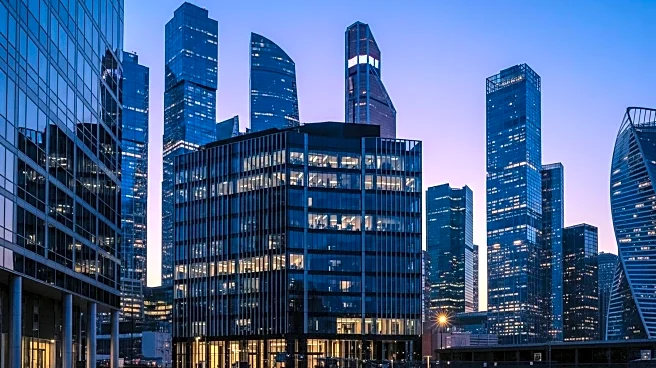What's Happening?
Christian Ulbrich, CEO of JLL, a commercial real estate and investment management company, shared insights on the evolving landscape of office spaces and city centers post-pandemic. Ulbrich, who has led JLL since 2016, discussed the impact of the COVID-19 pandemic on the real estate industry, noting that the recovery has been significant, with leasing volumes in the U.S. reaching nearly 90% of pre-pandemic levels. He highlighted a shift in client demands, with top companies seeking premium office spaces to attract talent. Ulbrich also addressed the challenges faced by central business districts, emphasizing the need for these areas to adapt by incorporating residential spaces and vibrant retail and entertainment options to remain attractive.
Why It's Important?
The insights from JLL's CEO are crucial as they reflect broader trends in the real estate industry, particularly the shift towards hybrid work models and the transformation of city centers. This evolution impacts urban planning, real estate investments, and the economic vitality of cities. As companies prioritize high-quality office spaces, there is a potential increase in demand for premium real estate, influencing market dynamics and pricing. Additionally, the transformation of city centers could affect pension funds and retirement savings, as these funds are significant investors in real estate. The adaptation of urban areas to new living and working patterns is essential for maintaining their economic and social vibrancy.
What's Next?
Ulbrich suggests that the future of city centers will involve a fundamental shift towards more livable spaces, with a mix of residential, retail, and entertainment options. This transformation requires strategic planning and investment to convert underperforming office buildings into residential areas and enhance amenities. The real estate industry must navigate these changes while addressing the financial implications for investors and stakeholders. Companies will continue to evaluate their office space needs, balancing remote work flexibility with the benefits of in-person collaboration and innovation. The ongoing adaptation to these trends will shape the future of urban environments and the real estate market.
Beyond the Headlines
The shift in city centers and office spaces raises ethical and cultural questions about urban development and the role of businesses in shaping community environments. The focus on premium office spaces may exacerbate inequalities, as smaller companies and lower-income individuals could face challenges accessing quality spaces. The transformation of city centers also involves cultural shifts, as urban areas become more integrated with residential life, potentially altering the traditional separation between work and home. These changes require careful consideration of social impacts and the long-term sustainability of urban development strategies.










